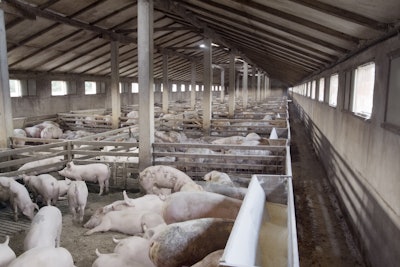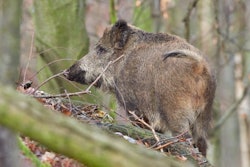
Over the past 10 days, animal health agencies of six European countries have officially registered further African swine fever (ASF) outbreaks affecting farms and backyard herds.
To the World Organisation for Animal Health (WOAH), the Romanian authority has confirmed 11 further outbreaks in the nation’s long-running battle to control the disease. Directly impacted by these outbreaks were a total of 141 domestic pigs, mainly in small non-commercial herds. One outbreak was linked to the dumping of 12 ASF-infected pig carcasses in a public area.
As ASF continues to spread in the Balkan states, two more outbreaks have been registered with WOAH in North Macedonia, and an additional one in Croatia.
Latest to be affected in North Macedonia were two small village herds at the end of November. These were located in Delcevo, a municipality in the Eastern Statistical Region where previous cases have been reported over the past two years.
Croatia’s most recently reported outbreak involved a farm with 513 pigs. Presence of the ASF virus was confirmed after 10 of the animals died at the premises, which is a municipality of Osijek-Baranja county, where first cases were detected in September. Since that time, outbreaks have affected 1,120 of the country’s domestic pigs — a total of more than 24,000 animals.
ASF outbreaks in Europe’s domestic pigs surpass 4,400
So far this year, one or more outbreaks of ASF have been recorded in 16 of the nations in this region. This is according to the Animal Disease Information System from the European Commission (EC; as of December 2), which covers notifiable diseases in member states of the European Union (EU) and most of its immediate neighbors.
The region’s total stood at 4,454, which compares with 537 recorded outbreaks in 12 European states during the whole of 2022, according to the same source. Approximately 60% of herds affected last year were in Romania.
Registering the most outbreaks in domestic pigs with the EC so far this year is Bosnia-Herzegovina, where the total has reached 1,486. Next come Croatia (now with a total for the year to date of 1,123), Serbia (977) and Romania (723). The next highest national total is for Ukraine (34 outbreaks for the year to date).
Since the EC’s previous update dated November 26, each of these countries had confirmed additional outbreaks — Serbia (10), Bosnia-Herzegovina (9), Romania (2) and one in each of Croatia and Ukraine.
Ongoing challenges for Italy’s pig farmers
ASF-related conditions continue to present huge challenges to the pig sector in the province of Pavia, Italy, reported Il Sole 24 Ore late last week.
Two months on from the first cases in this part of the Lombardy region, and after one month without any new cases in domestic pigs, the sector is in crisis. This according to the president of the provincial branch of the farmers’ association, CIA (Agricoltori Italiani).
For two months, farmers have had no income, while costs for keeping the animals, veterinary surveillance and biosecurity continue to mount up.
Around 40,000 of Lombardy’s estimated pig population of 5 million have been slaughtered as part of the stamping-out policy. For Pavia alone, losses have passed EUR100 million (US$107 million).
For local farmers, the most challenging is the refusal by some slaughterhouses to take their animals. Kept on the farms, these pigs continue to grow, making them too heavy for the most lucrative markets for Parma and San Daniele hams. Alternative buyers pay lower prices.
With movement restrictions on pig products also covering manure and slurry, storage capacity has been exceeded for many farms.
Over the past month, ASF cases have been found in new areas of Pavia and Milan. This has extended the area covered by restrictions even further. Still, farmers have received no reimbursement for their additional costs of fencing and other measures to control wild boar, or for testing of dead and hunted animals. Although payments have been established at the national level, the CIA says they have not yet been passed on by the regional health departments.
Just last month, it was reported that ASF restrictions were being eased for farmers in some areas of Lombardy.
ASF cases in European wild boar approaches last year’s total
So far this year, 20 countries have officially registered with the EC one or more outbreaks of the disease in their wild boar populations (as of December 2).
Total ASF outbreaks in this population recorded through this System has reached 7,276. For comparison, 15 European countries covered by the EC System registered a total of 7,442 outbreaks of ASF in this population in the whole of 2022.
The latest figure is 148 more than in the previous edition dated November 26, and 12 countries have registered new outbreaks through the System. Among these are Poland (with an increase of 39), Italy (30) and Bulgaria (17).
In the year to date, Poland has reported the most outbreaks in this category (2,566), followed by Italy (903), Germany (872) and Latvia (671).
All of these states registered new cases since the previous EC update, as well as Bosnia-Herzegovina, Estonia, Hungary, Lithuania, Romania, Serbia and Sweden.
According to the EC System, the Swedish outbreak total has reached 62, which is the same figure as the latest reported by the national veterinary institute SVA. All the cases were found within the original control zone designated as the country’s first cases were identified in late August.
In North Macedonia, the number of cases in the wild boar has risen by two, according to the latest notification to WOAH. Since ASF was first detected in the country almost two years ago, 100 infected wild boar have been reported there.
Not covered by the EC System is Russia. However, the veterinary authority has notified WOAH about the return of the ASF to the Udmurtia Republic after a three-month hiatus. In this region of the Volga federal district, two wild boar tested positive for the virus at the start of this month.
In recent days, a leading scientist with WOAH has called on ASF vaccine manufacturers to provide more information on their products to international researchers before further exports.
View our continuing coverage of the global African swine fever situation.
















